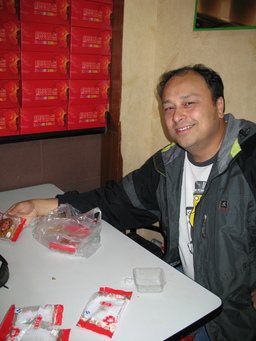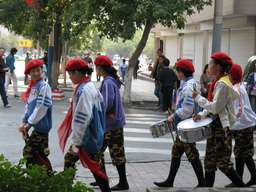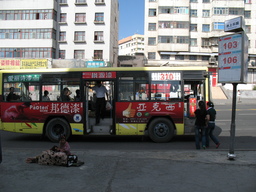
Munching on Mooncakes
 URUMQI, China
URUMQI, China
I've just met deadline once again for Chinese travel magazine World Vision. Every month on the 8th I'm supposed to deliver an article about my travels in China of at least 2,500 words. Every month I procrastinate--but always pull it out just before deadline.
Most of what I've been submitting over recent months has been repurposed content from this weblog. This article is fresh, so I figured I'd post it here as well.
In other news, I'm off to Altai tomorrow. Altai is the area I had been hoping to spend more time exploring when I came across the border from Kazakhstan this spring. I have something of a romantic notion of Altai: Meadows. Nomadic Kazaks, Mongols, and Tuvans. Lakes. Mountain ranges. The borders of four countries (Russsia, Kazakhstan, China, and Mongolia) coming together. Everybody I know who has spent time around Altai loves it.
I should be back in Urumqi after the coming weekend.
The minibus careered down the highway. Hands free of the wheel, the driver barked into a mobile phone protruding up out of one hand. A cigarette dangling down from the other hand balanced the act. I smiled softly. I was back in China.
A few minutes earlier, upon exiting the URC international terminal I felt immediately happy. Touts called out to me, each trying to get me into their own taxi. I ignored them and strolled over to the domestic terminal. I knew there would be a cheap 10-yuan minibus to the city waiting outside the other terminal.
What made for my good mood was not that I was saving money by avoiding the taxi touts and riding the minibus. (I actually could have made my trip into the city cost even less by walking a little farther to catch a local city bus.) What lifted my spirits was the familiarity of everything I saw upon returning to China after several months away. In my initial moments back in the country I felt charmed by all the routine habits and insignificant aspects of life which I hadn't realized I had been away from.
Drivers touting their taxi. Smoking while driving. Speaking into a mobile phone while driving. These are all such unremarkable aspects of everyday life anywhere in China--indeed over much of the world. However, I was returning to China after a summer spent in the U.S.. I hadn't seen any of these behaviors in three months. There was a soothing familiarity in the smallest details. I felt like I was back home.
As the minibus sped down the road, the couple seated across the aisle from me carried on an uninteresting conversation in Mandarin. I was rapt. I had spent the entire summer speaking English. I hadn't realized that several months had passed since I'd last eavesdropped on a conversation in Chinese. The two weren't talking about anything special, but I listened keenly. The tones sounded beautiful.
As the driver negotiated the road, he smoked cigarette upon cigarette. He took several calls on his mobile phone. I chuckled. In the U.S. I would have been nervous or frightened to ride in a bus with such a distracted driver. Not here. Local behavior and local laws vary. The state where I had just spent summer in the U.S. prohibits use of mobile phone handsets while driving. That same state also bans smoking in any public place--including in bars and restaurants. There would be no way for a bus driver to be either smoking or talking on a mobile phone while driving. Seeing all three happen at once I couldn't help but smile.
None of these behaviors are the aspects of life in China which have drawn me to make repeated, extended journeys here. Rather, they are the ordinary things which I forget about--until I'm back once again. In the immediate period after arrival, I find being suddenly back in the middle of it all delivers a charge. Everything around me sends another reminder that I'm now somewhere different and life elsewhere has been left behind.
 Munching on Mooncakes |
My favorite times entering a country are the times when I'm stepping back into a country in which I have previous experience, but have been away for some length. Those are the times when my observations are tinged with nostalgia. A brief period away will always bring perspective back. This is the case every time I come back to China. Having lived here so many years, few things I see upon returning after a few months spent out of the country strike me as completely unknown and novel. But that first time I see some familiar behavior or custom after a trip away it always excites me. "Oh yeah... I remember that. I forgot about that!" I'll reflect on the most mundane observations with a grin.
This state of seeing ordinary things anew often lasts for several days after my arrival. None of what I'm describing are those exotic attractions that people--Chinese or foreign--would ever mention when asking which places I've visited or what I've seen around China. I'm not talking about seeing the Great Wall. I'm not talking about seeing giant pandas in Szechwan. What impresses me in the initial days after returning are the many small details that together speak, "You're no longer in the U.S.. You're back in China, now."
Below is a list of things that have stood out in my mind since coming back to China a few days ago. They should strike anybody raised in this country as ordinary, unremarkable aspects of life. These are all things that were familiar, normal parts of my existence as well while living here. It's only after three months away that I again perceive them as being special, different from life elsewhere:
So many buildings in China's cities have accordion-style automatic gates which extend and retract along small wheels to control vehicle traffic. Next to the gate will be a shack with a guard on duty. These seem to be at the entry to nearly every building in Chinese cities. Very few other countries I've been to use this system.
I arrived back in China a couple weeks before the Moon Festival. It's fun to see all the different brands and flavors on offer for the holiday. Women in long, red, tight skirts are again offering their wares at tables around department and grocery stores.
I think I would find this ritual fascinating anyway, but as mooncakes are one of my favorite seasonal delicacies I'm especially enjoying being here now.
I think that everybody around the world likes to complain about how bad traffic in their city has become. Urumqi residents are no exception.
I've visited places with all levels of congestion, both inside of and outside of China. I've ridden on all manner of public transportation. I've driven cars both in cities where drivers are overly polite and driven in other cities where right-of-way is determined by vehicle size. Even with all that broad experience, I still find road manners in Urumqi to be unique.
What strikes me about traffic here is not gridlock. Though it's growing heavier, many cities are worse-off. Other Chinese cities may have more vehicles on the road, but I've never seen another city in this country with such chaotic traffic:
Even after several years living in China it yet startles me to see people walking along the edge of the road in the same lane that cars drive. The indifference where people choose to cross the street is particularly striking when I have just come back from a stay somewhere like the U.S. where completely different habits rule the road.
Perhaps things here will become more orderly before long. Over recent years I've seen efforts in cities across the country to reign in foot traffic, controlling which places people are permitted to walk. More and more intersections now have crossing guards with whistles who scold people who cross against the light. Large metal barriers stretching down the middle of many arterials have been fixed to force pedestrians to cross at intersections. Despite these efforts, I still see people dashing through traffic to climb over medians.
I realize that what I perceive as chaos isn't random. Drivers are aware of the flow. A driver in an American city would probably be flustered by some pedestrian walking along the edge of the road or crossing the street at some point between intersections. Such behavior would be so unexpected that it would likely result in an accident. People here know what to expect, though.
I do see far more accidents on the streets of Urumqi than I see in the U.S., but see far less than I would expect.
 Urumqi Bus Stop |
Most cities in the U.S. don't have such frequent service. Many have bus service set around a fixed timetable. Departures are usually less frequent. It can be necessary to wait half an hour or more between buses.
In Urumqi, I'm surprised if I wait more than five minutes for a bus.
There are few people I've met from the west who enjoy haggling over prices or who would proclaim that they themselves are adept bargainers. Those who do enjoy the process often see bargaining as a novelty to try over a limited period of travel. Many of the westerners I've known living long-term in Urumqi--myself included--view bargaining as an unwelcome hassle. It's a custom alien to us, a practice that hasn't been part of everyday life in America for several generations.
Since I've been back on this trip I've already had a couple times when I've thought, "Who would be willing to come along and help me with this errand I have to run today?" It's not that I lack the language skills to enquire about most purchases or to get something repaired on my own. It's the sense that I'll get a much better price if I go with a local.
Sometimes I'll shop with a local friend or choose to go alone to a store with fixed prices such as Carrefour. A big-box foreign chain store has character opposite to what keeps me coming back and traveling around China. It's a generic place that could be found in most any country on the planet today. However, the times I'm not in the mood for bargaining I'll go to such a place just to avoid discussion of prices.
Why is it that Chinese cities feel so crowded? The population of Urumqi is not large by Chinese standards. It's smaller than some of the other cities I've recently visited outside of China. However, I feel like there are always so many people out on the streets, so many people clustered together everywhere I go in Urumqi and other cities throughout this country.
This may be the one habit I can find no sense of nostalgia in, even after an extended period away. It still catches my attention how frequently each day I see or hear somebody spit.
Being in Xinjiang I see both the Uighur and Chinese scripts everywhere. Seeing signs in these languages after a long period away feels soothing for some reason I can't explain. Ironically, I can't always fully understand everything that's written. I think there's just something that I like about seeing signs around everywhere in different scripts.
There's only one thing that I've yet found different (improved) from when I was last here: the level of cleanliness on the streets of Urumqi. The streets are definitely cleaner. There is less trash about.
My time out of the country included the period over which the Olympics were held. I had assumed that there would be special attention to the country's image over that time. I expected many cities to be kept especially clean. I hadn't expected that practice would continue on well after the games had finished.
The aspect I find strangest about this heightened attention to details over my first days back is how fondly and nostalgically I look at such normal aspects of life. I find affection even for things I normally dislike. For example, I generally avoid both people smoking cigarettes and people talking loudly on mobile phones in public places. However, taking that crazy minibus from the airport into Urumqi somehow felt like the perfect "Welcome Back!"
It's good to be back in China.